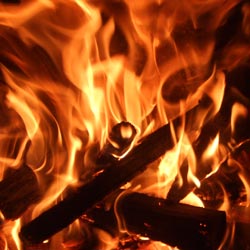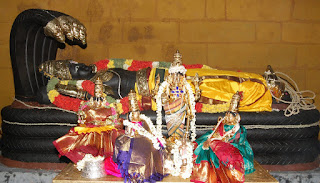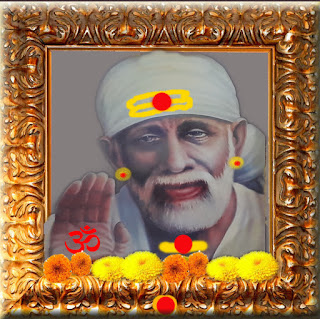REMEMBERING THE ANCESTORS,THE DEPARTED NEAR AND DEAR .........SHRADDHA.
 |
| AGNI THE SACRED FIRE |
In Hindu culture the annual prayer day is known as "Shraddha"which literally means respect or concentration. When a human being dies, the subtle body gets freed from the dead body after performing the ritual of Shraddha and it gets position in the subtle plane meant for souls of dead persons. At that moment it assumes the designation of Pitru.
The first annual death anniversary is observed by a shraddha ceremony that enables the deceased (preta) to be admitted into the assembly of forefathers (pitru).
So Shradha is rites performed to appease our departed ancestors with several offerings of food (to appease hunger), clothes, water (to appease thirst) or Daha shanti etc.Usually a "Homa kund"or sacrificial fire is needed. But if there are problems a "Hiranya shraddham" i.e, rites performed without the Agni kund or fire, may be performed.
 |
| HOMA KUND BUILT WITH BRICKS. |
The rite is both a social and a religious responsibility enjoined on all male Hindus (with the exception of some sannyasis, or ascetics)The Shradh rites should be performed by the male himself. However, since we do not know how to perform it, we get it done through a Brahmin priest who knows the rites.
Some Brahmins in the present times (who conduct Shradh rites) deny their consent for women to perform Shradh vidhi. This is because a "Karta"who performs the rites usually has a sacred thread over his shoulder to show that he is a Brahmin.
In the earlier days, the thread ceremony was performed on women too. In the present times, this practice has been discontinued in all the classes and therefore, even the practice of performance of Shradh vidhi by women has been discontinued. In emergency situations, however, if no one is available for performing Shradh vidhi, it is better that it be performed by a woman, than not performing it at all. Hindu Dharma does not allow to claim that the Shradh was not performed due to non-feasibility in a particular period .
 |
| WOMAN PERFORMING SHRADH CEREMONY |
Normally, Shradh should be performed every year on the tithi of death of the individual (and not on the date as per the English calendar). If the tithi is not known and only the month is known, then the Shradh can be performed on the Amavasya of that month.
If both, the tithi as well as the month are not known, the Shradh can be performed on Amavasya of the month of either Magha or Margashirsha.
Shradh for the pitrus (ancestors) should be performed every day. It can be performed simply through tarpana which is offering prayers(mantras) Til (black sesame) and water for "Daha shanti" or appeasing thirst.If this is not possible, at least "Tarpan" should be performed on the day of Amavasya (waning of the moon).It is believed that if you offer prayers,water and Til, it reaches our deceased ancestors.
Trup’ means satisfying others. The word ‘Tarpan’ has been formed from the root word ‘Trup’. Offering water to God, Sages, ancestors’ soul and human beings and satisfying them through it is called tarpan.
 |
| TARPAN |
 |
| OFFERING TIL AND WATER |
On Mahalaya day, special Tarpan is offered to the ancestors.This is also done other sacred days usually on Amavasya days.
A place smeared with cowdung, so also a place without any insects, animals and inauspicious objects, is ideal for performing Shradh. Offerings in a sacred fire with ghee etc is the ideal method for performing Shraddha. After reading the mantras, rice balls "Pindams" offered to the deceased are given to crows.It is believed that the deceased come to take the food in form of crows.
The imortance of performing Shradh in Gaya.. By offering pinda on the pretashila (Shila means a stone) at Gaya, the corpse state is destroyed and the soul goes to Pitrulok.
Repaying the debt to ancestors is as important as repaying the debt to God, Sages and the society. It is the duty of descendants to respect their ancestors, make donations in their name and to undertake activities that will please them. Performing Shraddha is a part of obeying Dharma, as per science of Dharma.
Due to the nonperformance of rituals like Pinda Shraddha and offering water to deceased ancestors etc. the ancestors of such people (who do not perform Shraddha) have to reside in the subtle plane apart from the Pitru's. Hence the ancestors are displeased and this results in stagnation and non progress of the descendants.
 |
| OFFERING PINDA OR RICE BALLS |
 |
| OFFERING PINDA AND WATER. |
After reciting the mantras and offerings are over, the priests sit down to take their meals in banana leaves. Before that, the person who performs the rites (karta) washes the feet of the priest and worships their feet. Also one leaf is placed for Lord Vishnu. Only a person of the family can eat from that leaf after rituals are completed. But the leaves in which the priests have taken their food with the food remaining in them are fed to cows.
After the priests have taken their food, the family members can partake food.
It is believed that the ancestors appear inside the priests and take the food.
Sage Sumantu has said, 'श्राद्धात् परतरं नान्यत् श्रेयस्करम् उदाहृतम् ।', meaning that nothing is as superior as the ritual of Shraddha. Therefore, a person having a pure intellect to discriminate between right and wrong should never abstain from performing Shraddha.
Brahma Puran says, 'One who performs the ritual of Shraddha diligently and in accordance with one's financial state, he satisfies everyone right from Lord Brahma to the insignificant blade of grass. No one in the family of the person performing Shraddha remains unhappy.'
By performing ritual of Shraddha for a deceased person, the give-and-take account that exists with that person gets fulfilled, e.g. if we owe something to a person and he dies before we could repay him, then by the virtue of performing Shraddha the loan can be repaid.
By performing Shraddha, a person can acquire a long life, success, heaven, fame, strength, wealth, animals, happiness, food, etc. If the ritual of Shraddha is performed on the day of an eclipse, the host derives benefit similar to the one obtained after donating a piece of land to someone.
An eternal position is obtained after death if Shradh is performed on the banks of Holy rivers such as Ganga, Saraswati, Yamuna, etc.; on a sea shore; at places of pilgrimage such as Prabhastirth, Pushkartirth, Prayag, Kashi, Gaya, Matrugaya, Kurukshetra, Gangadwar etc.; in the forests such as the Naimishkshetra, Dharmaranya, Dhenukaranya etc.; near the lakes of Brahmasarovar and Mahasarovar; at Akshayyavat, Mahakshetra (Names of places); and in the shade of gardens with Tulsi (Holy basil plant) and Amla trees.
When infants whose teeth and bone formation has not been completed die, Shraddha rites are not performed. As infants are neither attached to the world nor do
they have any give -and-take account to be completed in that
birth these embodied souls do not get trapped in the nether region
(bhuvalok). Hence shraddha rites are not performed after death of infants.
Shraddha rites are performed for upto three generations. These rites help in overcoming debts unto deceased ancestors (pitru).
According to Hinduism, the souls of three preceding generations of one's ancestor reside in Pitru–loka, a realm between heaven and earth. This realm is governed by Yama, the god of death, who takes the soul of a dying man from earth to Pitru–loka. When a person of the next generation dies, the first generation shifts to heaven and unites with God, so Shraddha offerings are not given. Thus, only the three generations in Pitru–loka are given Shraddha rites, in which Yama plays a significant role.
As mentioned in our Hindu Shastras, when a person is not in a position to perform Shraddha due to financial or any other reasons,he can do the following things.
-
Offer a pot of water
-
Offer some food
-
Offer some sesame seeds
-
Offer some money as dakshina
-
Offer foodgrains as per the capacity
-
Offer grass to a cow
-
Simply offer a pinda instead of performing a rite
-
After bathing, perform tarpan for pitrus' with black til.
-
Observe a fast on the tithi of the shradh
-
On the day of the shradh, read out the shradh rites
 |
| FEEDING GRASS TO A COW |
If any of the above are also not possible, the shradh should be performed as given ahead.Go into a forest; raise the arms and
showing a blade of grass to the Divine presiding Deities such as the
sun, etc. utter the following – ‘I have nothing, no wealth etc. which
can be used for performing the shradh. I pay obeisance to all my pitrus'. May all of them be satisfied with my devotion. I have raised my arms’.
Go into a forest without any habitation;
raise the arms skywards and shout loudly, ‘I have no wealth and no
food. Please liberate me from the debt unto my pitrus’.Face southwards and cry.
It is as simple as that. Real devotion is all that is needed.The Pitrus' will be not displeased and you will get their blessings.




Comments
Post a Comment